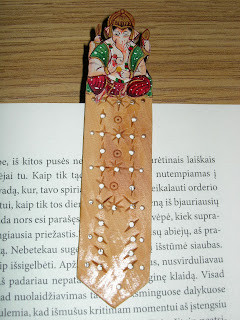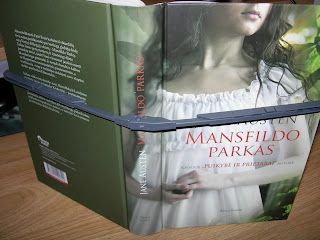Hello, my name is Liudmila. I was born in Lithuania, have family roots in Russia, but now I live in Norway:) I can't tell anything astonishing about myself... I'm not registered in the Guinness Book of Records, haven't invented the bicycle and wasn't elected as a president :D I'm an ordirary person with simple hobbies - love travelling, reading books, meeting my friends, I just love life as it is, with all advantages and disadvantages. I just have an interesting hobby - I collect bookmarks :) I'm a passionate bookmark collector and hope to find more collectors, exchange bookmarks with them, show my collection to others and have a look at other collections :) You can contact me, if you're interested in bookmark exchange :) Hope to find friends from all over the world :)
Saturday, March 31, 2012
Ganesha - God of auspicious beginnings.
Ganesha is one of the deities best-known and most widely worshipped in the Hindu pantheon. His image is found throughout India and Nepal.Hindu sects worship him regardless of аффилиатионс. Devotion to Ganesha is widely diffused and extends to Jains, Buddhists, and beyond India.
Although he is known by many other attributes, Ganesha's elephant head makes him particularly easy to identify.Ganesha is widely revered as the Remover of Obstaclesand more generally as Lord of Beginnings and Lord of Obstacles patron of arts and sciences, and the deva of intellect and wisdom. He is honoured at the beginning of rituals and ceremonies and invoked as Patron of Letters during writing sessions.Several texts relate mythological anecdotes associated with his birth and exploits and explain his distinct iconography. More...
Thank you very much,Charu :) I like it :)
Sunday, March 25, 2012
Book holder
It is a sort of lightweight travelling lectern – well, sort of, as it holds the pages of your book open for you, so you can relax and use your hands for grasping your cold glass of beer as you sit in the sun on the beach reading, without having to worry that the wind will keep turning your pages for you when you don’t want them turned. A problem all readers have experienced at one time or another.
Sunday, March 18, 2012
Spanish goat
The Spanish goat, also called the brush goat or scrub goat, came originally from Spain via Mexico to the USA. It is now a meat and brush-clearing type found widely in the U.S. In the Southeast and elsewhere, they are often referred to as "wood" (Florida), "brush" or "briar" (North Carolina, South Carolina), "hill" (Virginia), and "scrub" (midwest Pennsylvania) goats. Until recently, these goats were kept mainly for clearing brush and other undesirable plant species from pasture lands. More...
Thank you very much, Evelina :)
Friday, March 16, 2012
Tradicional ampelmann - traffic lights men from Berlin
Bookmark with lenticular changing image.
The bookmark is interesting beacause it is a hologram (or how it is called) - changing the angle of angle of vision changes the image. Permission to cross the street is the permission to read. When the red man appears - please be so kind, take a break :)
Ampelmännchen is the symbolic person shown on traffic lights at pedestrian crossings in the former German Democratic Republic (GDR - East Germany). Prior to the German reunification in 1990, the two German states had different forms for the Ampelmännchen, with a generic human figure in West Germany, and a generally male figure wearing a hat in the east.
The Ampelmännchen is a beloved symbol in Eastern Germany, "enjoy[ing] the privileged status of being one of the few features of communist East Germany to have survived the end of the Iron Curtain with his popularity unscathed."After the fall of the Berlin Wall, the Ampelmännchen acquired cult status and became a popular souvenir item in the tourism business. More...
Thank you very much for this bookmark, Simona :)
Wednesday, March 14, 2012
Tuesday, March 13, 2012
Lithuania
Lithuania , officially the Republic of Lithuania (Lithuanian: Lietuvos Respublika) is a country in Northern Europe, the largest of the three Baltic states. It is situated along the southeastern shore of the Baltic Sea, whereby to the west lie Sweden and Denmark. It borders Latvia to the north, Belarus to the east and south, Poland to the south, and a Russian exclave (Kaliningrad Oblast) to the southwest. Lithuania has an estimated population of 3.2 million as of 2011, and its capital and largest city is Vilnius. The Lithuanians are a Baltic people, and the official language, Lithuanian, is one of only two living languages (together with Latvian) in the Baltic branch of the Indo-European language family. http://en.wikipedia.org/wiki/Lithuania
Saturday, March 10, 2012
The porable of the Prodigal Son
The Prodigal Son, also known as the Lost Son is one of the parables of Jesus. It appears in only one of the Canonical gospels of the New Testament. According to the Gospel of Luke (Luke 15:11-32), a father, in response to his demands, gives the younger of his two sons his inheritance before he dies. The younger son, after wasting his fortune (the word 'prodigal' means 'wastefully extravagant'), repents and returns home, where the father holds a feast to celebrate his return. The older son refuses to participate, stating that in all the time the son has worked for the father, he did not even give him a goat to celebrate with his friends. His father reminds the older son that everything the father has is the older son's, but that they should still celebrate the return of the younger son as he has come back to them. It is the third and final part of a cycle on redemption, following the Parable of the Lost Sheep and the Parable of the Lost Coin.
In Western Catholic tradition, this parable is usually read on the third Sunday of Lent, while in the Eastern Orthodox Church it is read on the Sunday of the Prodigal Son. More...

In Western Catholic tradition, this parable is usually read on the third Sunday of Lent, while in the Eastern Orthodox Church it is read on the Sunday of the Prodigal Son. More...

Thank you ,Marina ;)
Subscribe to:
Posts (Atom)




































